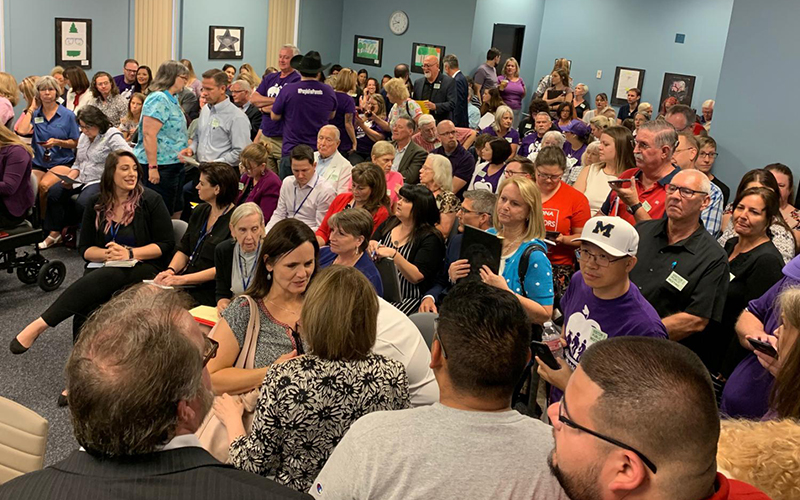PHOENIX – The Arizona State Board of Education declined Monday to make changes to its sex education policy for the state’s public schools.
“The rise of STDs (sexually transmitted diseases) and STIs (sexually transmitted infections) is a concern for me,” Superintendent of Public Instruction Kathy Hoffman said. “I’m also concerned about bullying in our schools and that there’s been a long history of stigmatization of our students in the LGBTQ community.”
More than 200 people attended Monday’s meeting, filling the board room and three overflow rooms at the department’s headquarters. They spoke for close to four hours during public comment.
What was the board considering?
The board considered opening rule-making on its sex ed policy, meaning officials could make changes after the board heard from the public, possibly multiple times.
The board did not vote on specific changes to policy Monday.
Hoffman asked the board to consider changes after receiving a letter from state Sen. Martin Quezada, D-Glendale. He thanked Hoffman for her work this spring to repeal the state’s “no homo promo” law and urged the board to go beyond striking the requirement that sex education “promote honor and respect for monogamous heterosexual marriage.”
In Quezada’s letter, the current language of section R7-2-303 is crossed out and his suggested language is capitalized:
- In regards to format of sex education instruction, “lessons
shallMAY be taught to boys and girls separately.” - “All sex education materials and instruction shall be age appropriate, recognize the needs of exceptional students, meet the needs of the district, recognize local community standards and sensitivities,
shall not include the teaching of abnormal, deviate, or unusual sexual acts and practices,BE MEDICALLY AND SCIENTIFICALLY ACCURATE. - Stress that sexually transmitted
diseasesINFECTIONS have severe consequences and constitute a serious and widespread public health problem, AND PROVIDE MEDICALLY ACCURATE INSTRUCTION ON METHODS TO PREVENT THE TRANSMISSION OF THESE INFECTIONS;
Read more of Quezada’s suggested changes here.
Hoffman said she considered the changes small and “not drastically changing sex education in Arizona.”

The Board of Education hearing room and three overflow rooms were filled to capacity Monday night. About 60 of the 200 people in attendance addressed the board. (Photo by Mariana Dale/KJZZ)
What did people say?
The Board of Education heard from about 60 members of the public. Most opposed prospective changes to the sex education policy. Purple for Parents, a parent-driven education advocacy group created to counter the #RedForEd teacher movement, encouraged people to attend the meeting on social media.
Sen. Sylvia Allen, R-Snowflake: “As much as possible our schools must remain neutral on moral and political issues.”
She said children with “gender identity confusion” should be protected.
“Schools are not the leaders in solving complex social problems,” said Allen, who has blocked changes to sex ed policy as chair of the Senate Education Committee for the past four years. “It is families that should take the lead while schools give support.”
Veronica Corcoran, one of several people who was concerned changing the sex education policy would sexualize children: “When children grow up, they will automatically know how to act on their God-given rights for intimacy, sexuality and reproduction.”
Scott Weinburg, the parent of two children in the Kyrene School District: “I believe in sex education, I believe in the science of it all. But the sexuality, the gender orientation, the sexual orientation, I think we need to leave that stuff for the parents.”
Nicholas Martin, fourth-grade teacher Deer Valley Unified School District: “The role of educators and policymakers is to ensure a free and appropriate public education for all students, that includes members of the LGBTQ-plus community.”
Madeline Adelman, co-founder of the GLSEN Phoenix Chapter, an education group that advocates for LGBTQ students: “The proposed rule changes enhance the safety and health of Arizona students in several simple and distinct ways.”
For example, giving schools the option to teach some co-ed sex education classes.
“There’s lots of reasons this could be a good option for some students, including students learning to be respectful in their communication with each other around people who have different bodies and different ideas,” Adelman said.
Karen Lambourne, self-described “ordinary retired person” and a former middle school teacher: “Why can’t we strengthen what is taught through individual parent participation?”
She recommended a mandatory, parent-supervised portion of sex education.
Alma Engel said sex education should be limited to “traditional biology” and called homosexuality “abnormal, an unsafe lifestyle.”
Frank Lister, a substitute teacher, said in his generation, health wasn’t taught in the classroom.
“I ended up with five kids, so I learned something. If you know nothing, get married. Think of the fun you have experimenting.”
Why is this happening now?
In April, lawmakers responded to a lawsuit against the Arizona Board of Education by repealing a portion of a 1991 law banning AIDS/HIV health instruction that “promotes a homosexual lifestyle,” “portrays homosexuality as a positive alternative lifestyle” and “suggests that some methods of sex are safe methods of homosexual sex.”
In May, as part of the lawsuit’s settlement, the board eliminated rules requiring sex education to “promote honor and respect for monogamous heterosexual marriage.”
Board member Armando Ruiz, who opposed those changes, said the catalyst for new changes should be the Legislature.
Board President Lucas Narducci, board members Calvin Baker, Michele Kaye, Patricia Welborn and Christine Burton agreed.
Declining to open rule-making essentially eliminates the possibility the board will consider further changes to statewide education policy anytime soon.
“I think there is a lot of interest in working on sex education topics, but I think we need to have more stakeholder engagements and parent involvement,” Hoffman said after the meeting.
Follow us on Twitter.